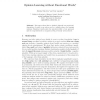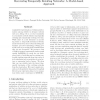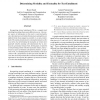92 search results - page 15 / 19 » Semantic Inference at the Lexical-Syntactic Level |
AI
2009
Springer
15 years 5 months ago
2009
Springer
This paper shows that a detailed, although non-emotional, description of event or an action can be a reliable source for learning opinions. Empirical results show the practical uti...
CICLING
2010
Springer
15 years 3 months ago
2010
Springer
We introduce an Information Extraction (IE) system which uses the logical theory of an ontology as a generalisation of the typical information extraction patterns to extract biolog...
JOCN
2011
14 years 5 months ago
2011
■ This study examined neural activity associated with establishing causal relationships across sentences during on-line comprehension. ERPs were measured while participants read...
ICML
2007
IEEE
15 years 11 months ago
2007
IEEE
A plausible representation of relational information among entities in dynamic systems such as a living cell or a social community is a stochastic network which is topologically r...
90
Voted
SEMCO
2007
IEEE
15 years 4 months ago
2007
IEEE
Recognizing textual entailment (TE) is a complex task involving knowledge from many different sources. One major source of information in this task is event factuality, since the ...



